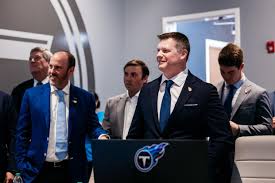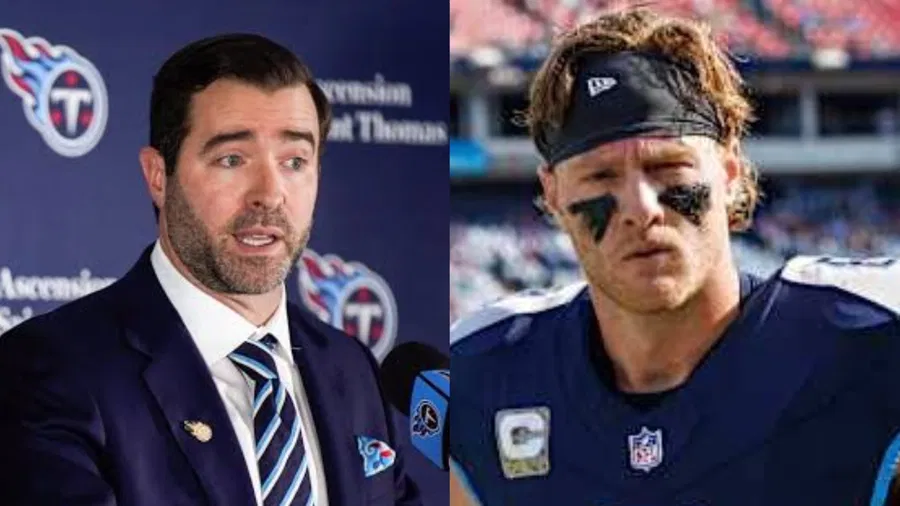 Last January, in the hours after the Tennessee Titans fired coach Mike Vrabel, general manager Ran Carthon refused to share his vision for the organization’s future.
Last January, in the hours after the Tennessee Titans fired coach Mike Vrabel, general manager Ran Carthon refused to share his vision for the organization’s future.A year later, in the hours after the Titans parted ways with Carthon on Tuesday, president of football operations Chad Brinker has no problem sharing his vision.
“We’re going to be a draft and develop organization,” Brinker told The Tennessean in an exclusive conversation. “What does that mean? Number one, we’re going to build the core of our roster through the draft. We’re going to be selective in free agency. We’re going to put a premium on finding playmakers, those players that impact the outcomes of games. Premium players and premium positions with premium picks
“Once we acquire those players, we’ve got to put an emphasis on development. Developing our young players means they’ve got to play, and you’ve got to live through some of those growing pains early. And be willing to not only develop them on the field but off the field. Number three, we’ve got to identify our best and retain our core performers. Draft, develop, retain. That’s our vision. This is a process that requires patience over panic. It requires discipline. Disciplined people, disciplined action.”
Per the terms of Carthon’s dismissal, Brinker now has final say on the Titans’ personnel decisions and will serve as the tie-breaking vote in situations when consensus can’t be met. He’s also the person in charge of hiring the Titans’ next general manager. Despite the Titans’ next general manager not having final say on roster matters, Brinker maintains this is a real general manager position, one that his friends and contacts throughout the league have leapt to tell him will be attractive to candidates.
“This will not deter most candidates,” Brinker said about the new GM not having autonomy over the roster. “Maybe there are some that would not find this as attractive. But not based off since the press release went out… They find this a very attractive job because it truly is. It’s a true general manager job.”
Brinker’s been in the Titans’ organization since 2023, when Carthon hired him away from Green Bay to be Tennessee’s assistant general manager. When asked why the Titans didn’t operate by his “draft, develop, retain” in that time, Brinker and Titans CEO Burke Nihill spoke about the changes in controlling owner Amy Adams Strunk’s strategies.
At the time Carthon was hired, the goal was to find a general manager with an “outside view of things” and a “different approach for how to build a roster.” Priorities are different now, and Nihill says ownership wants to bring in a general manager with different experience and a different skill set.
Brinker brought up the patience point several times. He says he can’t guarantee the Titans will be able to turn from a 3-14 team to a contender overnight. Drafting, developing and retaining a team, after all, is a years-long process. He calls draft picks “currency” and says it’s really important to start home-growing superstars instead of trying to attract them in free agency. He pointed to his roots in Green Bay for proof of how this philosophy works, and to the general managers who spread this philosophy to places like Seattle and Kansas City as proof of its replicability.
But time, the kind Brinker is calling for, hasn’t necessarily been afforded to his predecessors. Jon Robinson, who held the Titans’ GM job before Carthon, was fired without ever overseeing a team with a losing record. Vrabel was fired two seasons after earning the No. 1 seed in the AFC. Carthon was fired just two seasons into his tenure, albeit without as many achievements as Robinson or Vrabel to show for his time.
When asked if he believes Adams Strunk will afford the team the time it takes to execute this vision, Brinker didn’t answer directly, but instead preached what he knows.
“We’re in a very prime position right now,” he said. “It’s a disappointing year. Nobody was good enough. We’ve got to be better. We will be better. We’ve got a chance to really flip our franchise. We’ve just got to do a better job of being disciplined in how we’ve got to approach our draft strategy, our free agency strategy and all the things that go with that. Because this is a proven system. I can’t promise you how quickly this thing’s going to turn around. But I can promise you we have a plan. We’re going to communicate this plan. And then we’re going to work our tails off to execute this plan.”



